








Marriage is often described as a partnership built on love, trust, and commitment. Yet, one factor consistently stands out as the foundation of a healthy marriage: communication. Without it, misunderstandings fester, conflicts escalate, and intimacy fades. With it, couples can navigate challenges, deepen connection, and build lasting trust.
In this blog, we'll explore the role of communication in healthy marriages, why it matters, what happens when it breaks down, and how to improve it for long-term happiness.
Healthy communication is more than just talking; it's about understanding, listening, and being emotionally available. It builds the bridge between two individuals with unique backgrounds, perspectives, and needs.
Benefits of strong communication include:
Famous point: Dr. John Gottman, renowned relationship researcher, found in his 40+ years of studies that communication patterns predict whether a marriage will succeed or fail with 90% accuracy.
When communication breaks down, couples often experience a slow drift apart. Even small misunderstandings can snowball into resentment if not addressed.
Signs of poor communication in marriages:
Research point: According to the American Psychological Association (APA), poor communication is one of the leading causes of divorce.
Healthy communication starts with listening, not just hearing words, but understanding emotions behind them.
Tip: Put away distractions and give full attention when your partner speaks.
Bottled-up feelings often explode later. Sharing emotions honestly prevents resentment.
Example: Instead of "You never care about me", say "I feel lonely when we don't spend time together."
It's not what you say, but how you say it. A respectful tone fosters safety and cooperation.
Body language, eye contact, and touch play powerful roles in showing empathy and love.
Healthy couples don't fight to win; they communicate to find solutions.
Gary Chapman, author of The Five Love Languages, highlights that couples must learn each other's unique way of giving and receiving love. Communication is not one-size-fits-all.
Esther Perel, world-renowned psychotherapist, emphasizes that curiosity and open dialogue keep passion alive in long-term marriages.
Maya Angelou once said, "Words mean more than what is set down on paper. It takes the human voice to infuse them with deeper meaning." This applies beautifully to marital conversations.
Disagreements are normal in any marriage. The difference between healthy and unhealthy couples is how they communicate during conflict.
Famous point: Gottman's research shows that couples who repair conversations quickly after arguments are the most likely to thrive long-term.
True intimacy is not just physical—it's emotional. Couples who openly share their dreams, fears, and vulnerabilities create a safe space where love thrives.
The role of communication in healthy marriages cannot be overstated. It is the thread that weaves love, trust, and partnership together. By practicing active listening, respectful expression, and empathy, couples can not only prevent misunderstandings but also build a resilient and fulfilling relationship.
Remember: Good communication doesn't happen by chance, it happens by choice and effort. Make the choice daily, and your marriage will flourish.
Whether you're looking to strengthen an already healthy relationship or address specific challenges, couples therapy can provide valuable tools for growth and connection. Contact us to learn more about our couples counseling and relationship therapy services.
If this article resonated with you, share it with others who might benefit from these insights.